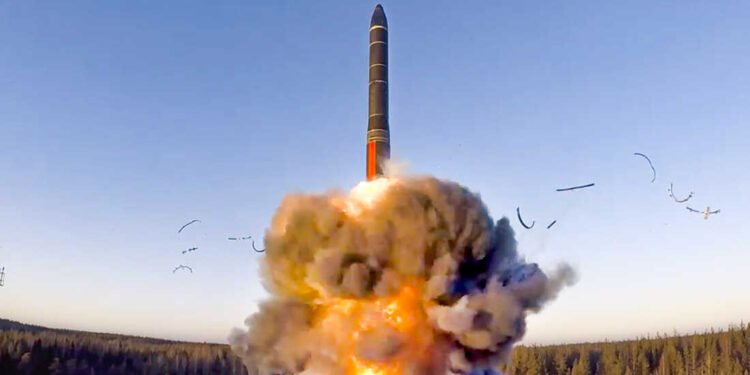London (Brussels Morning Newspaper) – The UK’s independent nuclear deterrent has deterred the most severe threats to our national security and way of life for almost 60 years, ensuring our safety and that of our NATO allies.
The probability of nuclear war is low, but the UK’s threats are growing in magnitude, variety, and complexity, according to Ministry of Defence documents.
Vladimir Putin attributed Russia’s alert level increase to Western “aggressive comments.” Later, the Kremlin named UK Foreign Secretary Liz Truss as one of the individuals who outraged Moscow. Russia won’t use nuclear weapons, even if the level adjustment is provocative. If such a weapon were unleashed, can the UK defend against a nuclear attack?
The Nuclear Threats faced by the UK
The likelihood of a nuclear battle occurring is very low, yet, the breadth, variety, and complexity of the dangers the UK confronts are rising. Because of this, it is imperative that we can discourage even the most severe forms of aggression directed against our NATO partners and us.
The United Kingdom has maintained a steadfast and pioneering attitude toward nuclear disarmament, but other governments have not followed in its footsteps. Some are substantially expanding their nuclear capabilities, while others are broadening their arsenals. We must take the necessary precautions to guarantee that they will never be able to use their nuclear weapons to threaten us, interfere with our ability to make decisions, or support nuclear terrorism.
The expansion of Russia’s nuclear arsenal is an example of this trend and compared with the systems held by the UK and fellow NATO nuclear weapons states France and the United States. NATO prepared this graphic to help explain how some states are expanding their nuclear capabilities. It demonstrates that Russia is dramatically expanding the types of nuclear-capable weapons that it has. This starkly contrasts the efforts that NATO governments who possess nuclear weapons have made since the end of the Cold War to decrease their arsenals and keep them at relatively low levels. Additionally, China continues to advance its nuclear capabilities by modernising and expanding its arsenal.
Although it is possible that these dangers are not directly relevant to the lives that we lead on a day-to-day basis, the United Kingdom must maintain the capacity to defend itself and its NATO partners. If we were to give up our nuclear deterrent, it would place all of us in a more precarious position since deterrence plays an essential part in maintaining public safety.
Read More: 10 Safest Countries That Will Survive Nuclear War
Why do we need nuclear deterrence?
Nuclear deterrence is intended to do three things: keep the peace, stop coercion, and discourage violence. Anyone considering an assault on the United Kingdom or our NATO partners knows that the costs might surpass any potential rewards. This prevents hostile countries from utilising nuclear weapons against us or posing the gravest risks to our security.
The claim that the United Kingdom’s nuclear deterrent is never employed is false. The truth is that it guards us constantly. Our nuclear deterrent decreases the risk of an attack by giving a credible and effective reaction option to extreme aggression.
So, Can the UK defend against a nuclear attack?
The Independent Nuclear Deterrent has been in existence in the United Kingdom for more than 60 years, and its purpose is to deter the most dangerous threats to the country’s security, or, in other words, to prevent the deployment of nuclear weapons on innocent civilians in the event of an invasion.
While the United Kingdom and other NATO members have been at the forefront of nuclear disarmament, other countries, such as Russia and China, have continued to build up and diversify their nuclear arsenals. The Cold War spectre of mutually assured destruction continues to be used as the primary argument for western allies to keep their nuclear weapons.
Although few people realise it, our nuclear deterrent is always on the job, keeping our coasts safe in “an increasingly unpredictable and hazardous world,” as a Ministry of Defense video puts it.
At least one nuclear-armed ballistic missile submarine is always at sea, undiscovered by enemy intelligence. Ministers say the Continuous At Sea Deterrent has the adequate destructive capability to defend against an assault and deter prospective enemies.
Conclusion
The UK has pledged NATO nuclear defence since 1962. NATO’s nuclear deterrent, including the UK’s, protects European and Euro-Atlantic security. UK strategy prioritises NATO membership and a strong nuclear Alliance.
Can the UK defend against a nuclear attack? While NATO supports the UK’s nuclear deterrent, we control its use. Only the UK Prime Minister may authorise nuclear use even in a NATO reaction.




